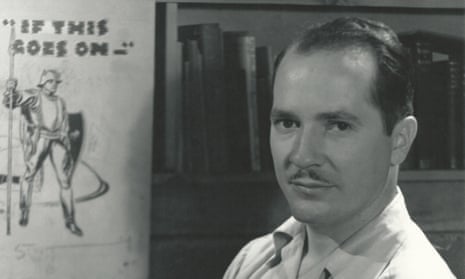An unpublished book by Robert A Heinlein, which provides a completely new ending to the author’s controversial novel The Number of the Beast, has been reconstructed from notes and typed manuscript pages left behind by the Hugo award-winning author.
Heinlein was a major figure in 20th-century science fiction, the author of works including Starship Troopers, Stranger in a Strange Land and The Moon Is a Harsh Mistress. According to publisher Phoenix Pick, which worked with the Heinlein Prize Trust to reconstruct the text, Heinlein wrote it as an alternate version of 1980’s The Number of the Beast. One of his later works, that novel was described in a blurb as following the adventures of “four supremely sensual and unspeakably cerebral humans – two male, two female”, who “find themselves under attack from aliens who want their awesome quantum breakthrough”. Its critical reception was not warm. “An embarrassment; it is unremittingly awful,” according to Dave Langford in 1981, who highlighted Heinlein’s treatment of sex and “every character’s gross and grotesque obsession with breasts”, while a School Library Journal write-up called it “a catalogue of Heinlein’s sins as an author; it is sophomoric, sexist, militantly rightwing and excessively verbose”.
The new version runs to around 185,000 words, and while it mirrors the first third of the published story, Phoenix Pick said it is “much more in line with traditional Heinlein books, and moves away from many of the controversial aspects of the published The Number of the Beast”.
Phoenix Pick hopes to release the new book, which is tentatively titled Six-Six-Six, and a new edition of The Number of the Beast, by the end of the year.
Publisher Shahid Mahmud admitted that The Number of the Beast was “a very unusual book”. “The first part starts off like a more traditional Heinlein (good guys, bad guys, etc), but then just morphs into something more closely resembling a parody … and ends with a strange party scene in which many of [his] characters and many of his actual friends appear,” he said. “The book caused a controversy because it had a lot of real people in it (albeit half-veiled by pseudonyms) and morphed into this big party with a lot of free sex … Many of his fans just did not know what to make of it.”
Mahmud said that the new version “reads much more like a traditional Heinlein adventure story … and ends in a much more traditional Heinlein way”. Mahmud and those who have already read it “enjoyed the new version a lot more”, he said.
Farah Mendlesohn, author of a forthcoming critical study of the works of Heinlein, described the original Number of the Beast as “effectively a Carry On movie in which four people travel in a camper van through alternative and increasingly metafictive universes” and said she had grown to “regard it affectionately”.
“Like most people I had rather dismissed the later Heinleins, because he really wasn’t as good a satirist as he wanted to be, but rereading them, I could see the way he was revisiting and rethinking some of his earlier arguments, and in particular beefing up the roles of women,” she said.
Mendlesohn said she was keen to read Six-Six-Six: “Heinlein mined so much of his material from older books, and rethought so many of his ideas at different points, that this book could be a real contribution to understanding his internal grand narrative.”
Science fiction novelist and academic Adam Roberts was less keen. “Heinlein certainly was a major figure in science fiction, and his early novels are still read and still worth reading … I don’t agree with his politics but I can’t deny he manages to express his views eloquently without losing narrative momentum or world-building pizzazz. But … his later novels are, well, just awful: sprawling, self-indulgent, preachy. And, I’m sorry to say, The Number of the Beast is where the rot sets in. A very bad novel,” said Roberts.
Referring to a line from the book, where a lady describes a kiss – “Our teeth grated and my nipples went spung!” – Roberts said: “For many science fiction fans, it will always be the ‘spung!’ book.”
